
July 24
1908 Turkey: The Sultan restores constitution at the demand of Young Turk rebels:
In the first decade of the 20th century, members of the CUP, one of many rebellious secret societies within Turkey, infiltrated the Ottoman Third Army, which was charged with the difficult duty of pacifying Macedonia, an Ottoman province in the center of the Balkans region coveted by Greece, Serbia and Bulgaria alike and plagued by lawlessness and disorder. The goal of the Young Turks was to modernize and reinvigorate the faltering empire and stop Europe from taking Ottoman territory, starting with Macedonia.
Spurred to action by the revelation, in June 1908, that Russia and Britain had hatched a plan to send in European officers to police Macedonia and restore order, the Young Turks briefly surfaced from their murky secrecy to lodge their forceful protests against such measures, which would effectively have meant Turkey had lost control of yet another province. The sultan took the opportunity to send his officials to arrest various CUP leaders; the Young Turks eluded capture and fomented a rebellion within the army, demanding restoration of the Turkish constitution. As a response to the mounting turmoil, the sultan had no choice but to grant this demand, which he did on July 24, 1908, calling a session of parliament to address the Young Turks further calls for reform.
1914 Countdown to World War: The text of the telegram dispatched by the Serbian regent, Alexander, to Russian Tsar Nicholas II in the midst of the so-called July Crisis of 1914. One day earlier the Austro-Hungarian government had dispatched to Serbia a harsh ultimatum in response to the assassination of Austrian Archduke Franz Ferdinand a month earlier.
Conscious of its international duties, Serbia from the first days of the horrible crime declared that she condemned it, and that she was ready to open an inquiry on her territory if the complicity of certain of her subjects were proved in the investigation begun by the Austro-Hungarian authorities. However, the demands contained in the Austro-Hungarian note are unnecessarily humiliating for Serbia and incompatible with her dignity as an independent State. Thus we are called upon in peremptory tones for a declaration of the Government in the "Official journal," and an order from the Sovereign to the army wherein we should repress the spirit of hostility against Austria by reproaching ourselves for criminal weakness in regard to our perfidious actions. Then we have to admit Austro-Hungarian functionaries into Serbia to participate with our own in the investigation and to superintend the execution of the other conditions indicated in the note. We have received a time-limit of forty-eight hours to accept everything, in default of which the legation of Austria-Hungary will leave Belgrade. . We are ready to accept the Austro-Hungarian conditions which are compatible with the position of an independent State as well as those whose acceptance shall be advised us by your Majesty.
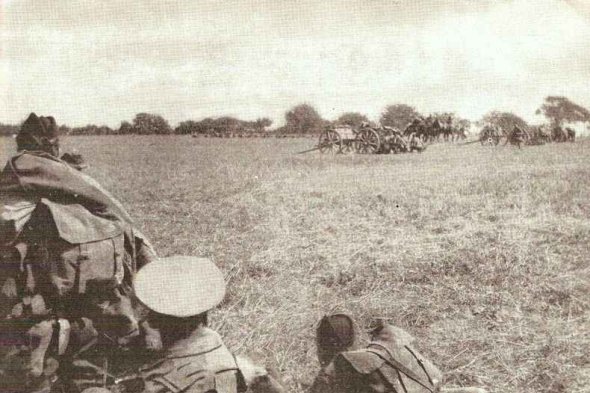
1915 World War I: List Regiment: Gefreiter Adolf Hitler's 16 Reserve Infantry Regiment continues to occupy a position at Fromelles—pictured above in a drawing by Hitler—on a level field with water channels, willow trees and willow stalks; in the distance towards the enemy lines lies an insignificant wood with barbed wire entanglements. Under the direction of their defense-minded commander, Lieutenant General Gustav Scanzoni von Lichtenfels, the regiment works ceaselessly day and night to further fortify their position at Fromelles while fighting off repeated assaults by the enemy. [For further details, Click here.]
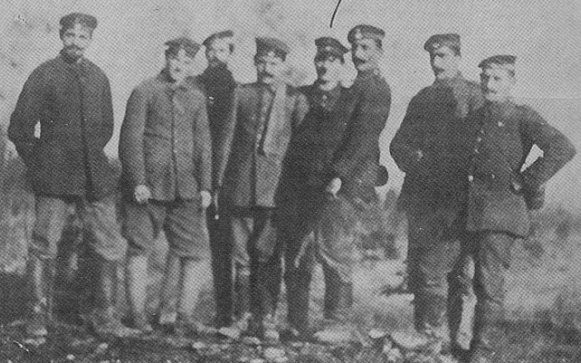
Hitler and his fellow dispatch runners
1916 World War I: List Regiment: Gefreiter Adolf Hitler endures trench warfare in Flanders (Artois) with 3 Company, 16 Reserve Infantry Regiment. [For further details, Click here.]
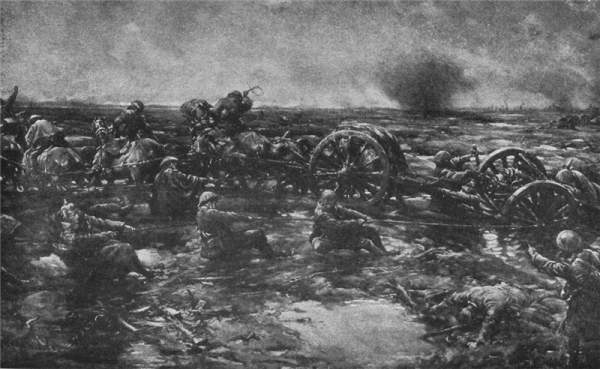
1917 World War I: List Regiment (July 22-August 3): Dispatch Runner Gefreiter Adolf Hitler serves at the front with 3 Company, 16 Bavarian Reserve Infantry Regiment during Phase 2 operations in Flanders. Most of their time in the trenches gas masks are worn, while English bombers and tanks—a new terror witnessed for the very first time by most—attempt to advance over a long front through seas of mud. [For further details, Click here.]
1918 World War I: List Regiment: (July 20-August 4):Gefreiter Adolf Hitler's 16th RIR is tasked with building a new line of defenses on the site of the failed Second Battle of the Marne. [For further details, Click here.]
1920 Antisemitism: London's Morning Post features a series of eighteen articles entitled "The Cause of World Unrest." A new translation of The Protocols by one of the Morning Post's reporters, Victor Marsden, is published by the anti-Semitic organization known as "The Britons." It becomes the standard English-language edition. (THP)
When we have accomplished our coup d'etat we shall say then to the various peoples: "Everything has gone terribly badly, all have been worn out with suffering. We are destroying the causes of your torment: nationalities, frontiers, difference of coinages. You are at liberty, of course, to pronounce sentence upon us, but can it possibly be a just one if it is confirmed by you before you make any trial of what we are offering you." . . . . Then will the mob exalt us and bear us up in their hands in a unanimous triumph of hopes and expectations. Voting, which we have made the instrument which will set us on the throne of the world by teaching even the very smallest units of members of the human race to vote by means of meetings and agreements by groups, will then have served its purposes and will play its part then for the last time by a unanimity of desire to make close acquaintance with us before condemning us. [For further details, Click here.]
1923 Treaty of Lausanne:
[By the Treaty of Sevres] concluded in 10th of August 1920 after World War I at Sevres, France, between the Ottoman Empire (Turkey), on the one hand, and the Allies (excluding Russia and the United States) on the other . . . . Turkey renounced sovereignty over Mesopotamia (Iraq) and Palestine (including Trans-Jordan), which became British mandates; Syria (including Lebanon), which became a French mandate; and the kingdom of Hejaz. Turkey retained Anatolia but was to grant autonomy to Kurdistan. Armenia became a separate republic under international guarantees, and Smyrna (modern Izmir) and its environs was placed under Greek administration pending a plebiscite to determine its permanent status.
In Europe, Turkey ceded parts of Eastern Thrace and certain Aegean islands to Greece, and the Dodecanese and Rhodes to Italy, retaining only Constantinople (modern Istanbul) and its environs, including the Zone of the Straits (Dardanelles and Bosphorus), which was neutralized and internationalized. The Allies further obtained virtual control over the Turkish economy with the capitulation rights.
The treaty was accepted by the government of Sultan Mehmed Vahdettin VI at Istanbul but was rejected by the rival nationalist government of Kemal Ataturk at Ankara. Ataturk's separate treaty with the USSR and his subsequent victories against the Greeks during the War of Independence forced the Allies to negotiate a new treaty in 1923 (Treaty of Lausanne) . . . .
Turkey recovered Eastern Thrace, several Aegean islands, a strip along the Syrian border, the Smyrna (modern Izmir) district, and the internationalized Zone of the Straits (Bosphorus and Dardanelles), which, however, was to remain demilitarized and remain subject to an international convention. Turkey recovered full sovereign rights over all its territory, and foreign zones of influence and capitulations were abolished. Outside the Zone of the Straits, no limitation was imposed on the Turkish military establishment. No reparations were exacted.
In return, Turkey renounced all claims on former Turkish territories outside its new boundaries and undertook to guarantee the rights of its minorities. A separate agreement between Greece and Turkey provided for the compulsory exchange of minorities.
1927 The Menin Gate war memorial is unveiled at Ypres.
1929 The Kellogg-Briand Pact, which renounces war as an instrument of foreign policy, is proclaimed by US President Herbert Hoover.
The High Contracting Parties solemnly declare in the names of their respective peoples that they condemn recourse to war for the solution of international controversies, and renounce it, as an instrument of national policy in their relations with one another.
1933 Various:
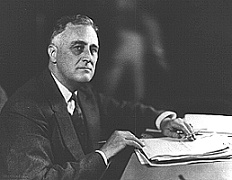
Last Autumn, on several occasions, I expressed my faith that we can make possible by democratic self-discipline in industry general increases in wages and shortening of hours sufficient to enable industry to pay its own workers enough to let those workers buy and use the things that their labor produces. This can be done only if we permit and encourage cooperative action in industry because it is obvious that without united action a few selfish men in each competitive group will pay starvation wages and insist on long hours of work. Others in that group must either follow suit or close up shop. We have seen the result of action of that kind in the continuing descent into the economic Hell of the past four years.
Church and Reich: The Concordat: The Voelkischer Beobachter describes the Concordat as a most solemn recognition of National Socialism by the Catholic Church. (THP)
The Concordat confirmed the dissolution of German Catholicism's trade unions and political organizations, but guaranteed the church traditional rights to cultivate and promote the practice of the Catholic rite, to maintain Catholic schools, and to appoint Catholic clergy. Many provisions of the agreement were promptly violated, however, as the Nazis persecuted Jesuits, Catholic Action (a religious and social movement), and various other Catholic organizations.
Resistance: The Federation of Polish Jews in America pledges support for the anti-Nazi boycott.
But if the Nazis were going to be destroyed by the winter 1933, as some boycott enthusiasts were prognosticating, this required a worldwide organization to coordinate efforts and produce a market where sellers and non-German suppliers could easily find each other. Otherwise, past the moment of initial enthusiasm, the boycott would fall apart.
1934 Austria: July Putsch: A German courier is arrested by the Austrian frontier police when he is discovered to be carrying documents, including cipher keys, indicating that a revolt against the Dollfuss government is being planned. Anton von Rintelin, then the Austrian Minister to Italy, is identified, with the help of German Nazis, as the organizer. (Churchill)
From the IMT testimony of Edmund Glaise-Horstenau:The economic situation at that time may be characterized through the average figure of unemployment. Out of 6 million inhabitants, 400,000 were unemployed, and that means, counting their families, that more than a million were in the misery of unemployment. In this connection [the expansion of the economic area] I can say openly and immediately that all the possibilities always received "no" as an answer. If Austria wanted the Anschluss, the answer was "no." If Austria wanted to call the Hapsburgs back, the answer was "no." If Austria wanted to enter a German customs union in order to expand her economic area, the answer was "no." And when great men like Briand and Tardieu spoke of a Danube federation, we received only cold shoulders from our autarchically minded neighbors. That is the Austrian tragedy.
In the year 1918 the standard bearer of this Anschluss was no less than the Social Democratic Party led by Otto Bauer who the year before had declared the Anschluss to be the only possibility for the Austrian proletariat. Later the National Socialist Party crowded to the front, though it was not unified, to be sure, until the end of the twenties by unconditional subordination to the leadership of Adolf Hitler. The leaders themselves changed frequently. Hitler, however, sent a land inspector by the name of ... what was his name; a Prussian—I cannot think of the name at the moment—who was evicted from the country by Dollfuss in 1933. Habicht, Dr. Habicht is his name. After him, Captain Leopold rose to the leadership of the Party. They considered themselves bound by absolute obedience and loyalty [to Adolf Hitler].
A month earlier, during his frustrating excursion to Italy, the Fuehrer had promised Mussolini to respect Austrian independence. It was a considerable concession since Anschluss, incorporation of his homeland into a Greater Germany, had been one of Hitler's first goals. Despite this promise his own SS did not cease sending considerable financial and moral support to Austrian Nazis, who carried on a campaign of terrorism, blowing up railways and power stations with German dynamite and murdering supporters of Chancellor Engelbert Dollfuss with German weapons. Ironically the diminutive Dollfuss was a nationalist, authoritarian reactionary who was countering the threats of both Nazism and Socialism with suspension of parliamentary government. Earlier in the year Dollfuss had put down revolt from the left by bombarding Socialists entrenched in a huge housing development until they surrendered. Since then he had concentrated on wiping out the local Nazis, reinforced by assurance from Mussolini that he would restrain Hitler from retaliation.
Perhaps the Austrian Nazis were inspired by the hubbub following the Roehm affair to take direct action. More likely, though there is no proof, Hitler approved it. At any rate, on July 25 they suddenly launched their own Putsch, under the code name Operation Summer Festival. (See: July 25, 1934)
1937 Holocaust: An order segregating Jews from "Aryans" in German health resorts and public baths is issued.
1939 Holocaust: A numerus clausus is instituted in Slovakia, restricting Jews in the professions to four percent while another Slovak decree dismisses all Jews from the army.
1940 Church and Reich: The Sacred Congregation of the Holy See in Rome rules that Catholic nurses in state-run hospitals may assist in sterilization operations if a sufficiently important reason is present. (THP)
1941 Vichy France accedes completely to Japanese demands for bases in southern Indochina.
[See: Countdown to Infamy: Timeline to Pearl Harbor.]1942 World War II: Barbarossa: The Soviet city of Rostov is captured by German troops. Large numbers of Russian troops are liquidated in and around Rostov after German troops secure the city.
1943 July 24-25 Operation Gomorrah:
Britain had suffered the deaths of 167 civilians as a result of German bombing raids in July. Now the tables were going to turn. The evening of July 24 saw British aircraft drop 2,300 tons of incendiary bombs on Hamburg in just a few hours. The explosive power was the equivalent of what German bombers had dropped on London in their five most destructive raids. More than 1,500 German civilians were killed in that first British raid.
Britain lost only 12 aircraft in this raid (791 flew), thanks to a new radar-jamming device called "Window," which consisted of strips of aluminum foil dropped by the bombers en route to their target. These Window strips confused German radar, which mistook the strips for dozens and dozens of aircraft, diverting them from the trajectory of the actual bombers.
To make matters worse for Germany, the U.S. Eighth Air Force began a more comprehensive bombing run of northern Germany, which included two raids on Hamburg during daylight hours.
British attacks on Hamburg continued until November of that year. Although the percentage of British bombers lost increased with each raid as the Germans became more adept at distinguishing between Window diversions and actual bombers, Operation Gomorrah proved devastating to Hamburg-not to mention German morale. When it was over, 17,000 bomber sorties dropped more than 9,000 tons of explosives, killing more than 30,000 people and destroying 280,000 buildings, including industrial and munitions plants. The effect on Hitler, too, was significant. He refused to visit the burned-out cities, as the ruins bespoke nothing but the end of the war for him. Diary entries of high German officials from this period describe a similar despair, as they sought to come to terms with defeat.
1944 World War II: Various: Russian Front:
Russians occupy Hungerberg and Riigi. Lublink, Poland is occupied by the Soviets. The River San is crossed by the Soviets northwest of Lvov. The 3rd Baltic Army, consisting of 20 divisions, faces the German forces in the region of Narva—the entire Northern front is set to explode.
The Secret Diary of Anti-Hitler Conspirator Ulrich von Hassel (By Wolf Ulrich von Hassel):
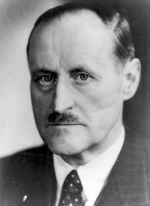
. On July 24 he met Gisevius by chance in Grunewald. Gisevius was waiting for a chance to flee. He told me later about this strange meeting. Gisevius was filled with bitterness, and deeply depressed by the failure of the last attempt at the overthrow. He complained that he and his particular friends had been excluded in the final phase of preparations, and in the planning for the future. My father saw, above anything else, the deed that had at least revealed to the world, even in the last hour, the fight being waged by the other Germany. It depressed him that now internal reproaches among the plotters were already threatening to come into the foreground. Popitz, the minister of finances, had already been arrested on the morning of July 21, 1944. On the same day and the following day, my brother anxiously telephoned.
US forces invade Japanese-held Tinian:
The American victory in the battle of Saipan made Tinian, 5.6 km (3.5 miles) south of Saipan, the next step in the Marianas campaign. The 2nd and 4th Marine Divisions landed on 24 July 1944, supported by naval bombardment and artillery firing across the strait from Saipan. A successful feint for the major settlement of Tinian Town diverted defenders from the actual landing site on the north of the Island. The Japanese adopted the same stubborn defensive tactics as on Saipan, retreating during the day and attacking at night. The gentler terrain of Tinian allowed the attackers more effective use of tanks and artillery than in the mountains of Saipan, and the island was secured in only nine days of fighting.
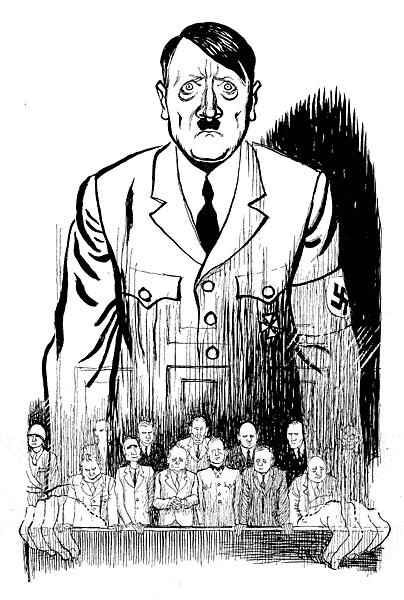
1946 Nuremberg Tribunal: Defense summations continue in the Major War Criminals Trial. One point in common with nearly all of the arguments of the various Defense Counsel is that there is a major absence among the Defendants; Adolf Hitler himself.
Dr. Otto Freiherr von Ludinghausen (Counsel for Defendant Constantin Von Neurath):At the time when Hitler charged the defendant with the office of the Reich Protector he had, according to the defendant's testimony, assured him of far-reaching power, especially for protecting and fully supporting the defendant's intended policy of conciliation and compromise in opposition to radical aims of the Party and other chauvinistic circles. The defendant deduced from this that as the representative of the Fuhrer in the Protectorate he must and would have a decisive influence on the activity of the Police also. According to his own testimony he could not visualize at that time that a large part of the sphere of activity accepted by him became illusory from the start, since the Police had not been from the outset expressly subordinated to him. However, due to the fact that Frank-who had been made Higher SS and Police Fuhrer in the Protectorate-was at the same time appointed to the position of State Secretary, and as such was subordinated to him, the defendant felt entitled to assume that Hitler's intention was to centralize the police authority, if not in his own hands, at least under his jurisdiction-that is, in the hands of his State Secretary. In practice, however, this relation worked out entirely differently, since State Secretary Frank had not the slightest intention of letting his official chief, the defendant, have any authority whatsoever over the Police, and recognized only the jurisdiction and authority of Himmler, his superior, as SS and Police Leader, or of his Reich Main Security Office (Reichssicherheitshauptamt).
Dr. Heinz Fritz (Counsel for Defendant Hans Fritzsche):As far as the alleged crime against peace is concerned, the Prosecution act on the assumption that any important political and military attack on the part of the German state leadership was preceded by a press campaign. Therefore, the Nazi conspirators must have used the press also as an instrument of foreign policy and as a feint to cover subsequent aggressive action. From that general, perhaps even correct, description of such intentions, the far-reaching conclusion is drawn that Fritzsche may also be partly responsible for them. Such responsibility would be based merely on the chronological circumstance that he was the Chief of the German Press Division within the official Ministry of Propaganda from December 1938 to the spring of 1942. But the premises are lacking for this conclusion. It could only be justified if it had been successfully proved that Fritzsche was the real creator and inspirer of all those press campaigns. But Fritzsche, if only because of his subordinate position-subordinate not only in regard to the departmental organization but also compared with the real leaders of propaganda, Hitler, Goebbels, Dietrich, and others-could know only what his superior passed on to him-as well as to other civil servants-as the historical truth. [See: How Did Hans Fritzsche Avoid the Noose?]
[For the full text of today's proceedings, Click here.]1948 Cold War: Soviet occupation forces in Germany blockade West Berlin:
The Americans claimed that Stalin was trying to force the USA out of Berlin, and that the blockade was Russian empire-building in eastern Europe. Stalin, however, claimed that—by introducing the new currency—the USA and Britain had been trying to wreck the East German economy. And he said that the airlift was simply a propaganda move intended to make the cold war worse.
1998 Saving Private Ryan opens in theaters:
On this day in 1998, the director Steven Spielberg's World War II epic, Saving Private Ryan, is released in theaters across the United States. The film, which starred Tom Hanks and Matt Damon, was praised for its authentic portrayal of war and was nominated for 11 Academy Awards. It took home five Oscars, for Best Director, Best Cinematography, Best Sound, Best Film Editing and Best Sound Effects Editing.
The film's lengthy opening scene was a bloody re-enactment of American troops landing at Omaha Beach in Normandy, France, on June 6, 1944. Following this violent D-Day scene, Saving Private Ryan centered around the fictional story of Captain John Miller (Hanks), and his band of seven rangers, who are sent on a mission to rescue Private James Francis Ryan (Damon), a paratrooper missing somewhere behind enemy lines. Ryan's three older brothers have recently been killed in action, so military officials order Miller to find the young soldier and prevent a public-relations disaster. As the men make their way across the battle-scarred French countryside they suffer several casualties before eventually locating Ryan in a bombed-out village, where he is helping to defend a strategically important bridge from the Germans. Ryan refuses to leave his comrades, even after Miller gave him the news of his siblings' deaths. Miller reluctantly agrees that he and his squad will stay to defend the area. When the Nazis attacked, the captain and many of his men are killed, but Ryan survives. [For further details, Click here.]
Edited by Levi Bookin (Copy editor) Click to join 3rdReichStudies Disclaimer: This site includes diverse and controversial materials—such as excerpts from the writings of racists and anti-Semites—so that its readers can learn the nature and extent of hate and anti-Semitic discourse. It is our sincere belief that only the informed citizen can prevail over the ignorance of Racialist "thought." Far from approving these writings, this site condemns racism in all of its forms and manifestations.
levi.bookin@gmail.com










Fair Use Notice: This site may contain copyrighted material the use of which has not always been specifically authorized by the copyright owner. We are making such material available in our efforts to advance understanding of historical, political, human rights, economic, democracy, scientific, environmental, and social justice issues, etc. We believe this constitutes a "fair use" of any such copyrighted material as provided for in section 107 of the US Copyright Law. In accordance with Title 17 U.S.C. Section 107, the material on this site is distributed without profit to those who have expressed a prior interest in receiving the included information for research and educational purposes. If you wish to use copyrighted material from this site for purposes of your own that go beyond 'fair use', you must obtain permission from the copyright owner.
Please Note: The list-owner and moderators of 3rdReichStudies are not responsible for, and do not necessarily approve of, the random ads placed on our pages by our web server. They are, unfortunately, the price one pays for a 'free' website.



